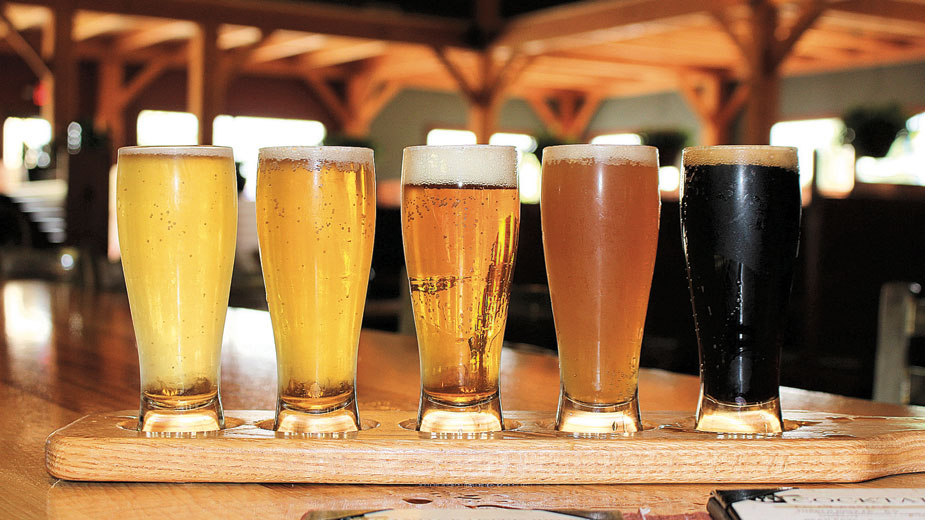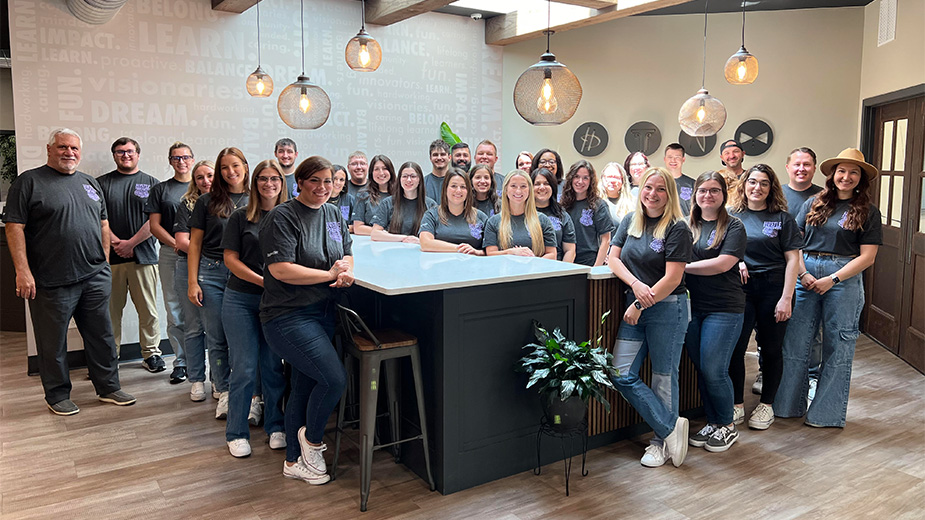Brewpubs Taste Success with 17th Century Business Model
YOUNGSTOWN, Ohio — The brewpub/craft beer concept is nothing new in America as evidenced by colonials in the 17th and 18th centuries who often brewed their own beer.
In 1612, Dutch settlers Adrian Block and Hans Christiansen established the first known brewery in what today is Manhattan. In 1757, while a colonel in the Virginia militia during the French and Indian War, George Washington recorded in his notebook his own recipe “to make small beer.” One ingredient was molasses to sweeten the taste of the beverage.
That tradition remains very much alive as the country once again embraces its taste for freshly brewed ale.
The Business Journal took to the road to sample three brewpubs in or very near Mercer County, Pa., two of which have opened within the last seven months – an indication of how fast the microbrew industry in this region is taking hold.
Stone Church Pizza House and Brewpub, Hermitage, Pa.
For decades, St. John’s Romanian Orthodox Church opened its doors every Sunday morning to an adoring congregation until it finally closed a decade ago.
Now, a different congregation packs the church converted to a brewpub at the corner of state Route 18 and Morefield Road in Hermitage, Pa., especially for lunch and dinner on the weekends.
“We opened a day after Christmas and we had people lined out the door with a two-hour wait,” says Jim Hicks, head brewer at the Stone Church Pizza House and Brewpub.

After the church closed, two developers bought the building and sought to lease it to prospective businesses, Hicks says. When that didn’t work, the partners decided it would be a great idea to transform the church into a restaurant and pub because it sits along one of the busiest thoroughfares in Mercer County.
And why not? Religion and beer have a long relationship that dates to the Middle Ages. Indeed, the oldest brewery in the world is still in operation – it brewed its first beer in 1040 – housed in Benedictine Weihesnstephan Abbey, just north of Munich, Germany. The nearby Weltenburg Abbey in Kelheim began making its beer just 10 years later and continues to brew today.
That theme fits perfectly with the Old Stone Church, Hicks says. The pub has the bright stained-glass windows and exposed brick that give it an Old-World ambiance, replete with a wood-fire pizza oven. “All of the beer sold here is brewed by us,” Ricks says, “and we usually have between 10 and 11 beers on tap.”
All of these beverages have a distinctive church moniker. A Noah’s Dark, for example, is a popular porter while the El Padre is a light Mexican-style lager suited for the warmer months and is the brewery’s most popular beer. “I like to have fun. I like to take a classic style and make it my own,” Hicks says.
Beer is made with four basic ingredients – hops, barley, yeast and water. Recipes differ depending on the proportions of each ingredient in a given beer, and a few extras thrown in for body and an additional kick.
There is a difference, for example, between American and German hops. American hops have a much bolder flavor and the German variety is “more like fresh cut grass,” he says.
“Just about every beer I brew has oats in it,” Hicks says. “I buy the hops, malts [barley] and everything I need.” Some beers call for a dash of citrus while seasonal beers, such as pumpkin ales, use other spices to provide distinctive flavors.
The operation uses five fermentation tanks and each one is dedicated to a specific style of beer, such as darks, lager or pale ales, Hicks explains. In about a month, the brewery will start selling its kegs to area taverns in Pennsylvania.
“We’ll be in Ohio as well. We think we’ll be rolling that out after the Fourth of July,” he says.
Meanwhile, the brewpub and restaurant continues to attract a steady clientele seven days a week. “Business has been great,” Hicks says.
“It was overwhelming at first, but we’re getting great support from the community and it’ll only get better as the weather improves and recreational activities start.”
North Country Brewing Co., Slippery Rock, Pa.
In hindsight, there was probably no better place to launch the craft beer and microbrew industry in western Pennsylvania than the small university town of Slippery Rock, just across the Mercer County line in Butler County.
Along quaint, shop-studded Main Street sits a fully renovated early 19th-century house that on a warm May afternoon is filled with patrons on the front patio, enjoying lunch, some partaking of freshly brewed beer. Along with its clapboard facade are very gnarly and very hip wood-carved porch spindles that appear straight out of the shire, an atmosphere that carries throughout the restaurant.
But what stands out about North Country Brewing Co. is its beer, brewed on-site and visible through a large glass window for passers-by and customers to see.
“Microbrews are booming,” says general manager Joe Guyette. “Being able to make them in-house creates the flair. All of our brewers have personality and their flair comes out in their craft.”

Owners Jodi and Bob McCafferty renovated the house – established by Peter Uber in 1805 – and opened the brewpub in 2005, Guyette says.
Since then, the beer has gained so much appeal that in 2013 the company opened up a new brewing and canning operation nearby along Arrowhead Drive to sell its most popular beers. The canning operation ships kegs and cans to every county in Pennsylvania as well as areas of Ohio and Florida.
Over the last 11 years, the company has brewed more than 100 beers and has 13 taps running at all times. “I’d say we get a new one every week or two, depending on the flow of customers coming through,” Guyette says. “If our brewers get a good idea, they’ll roll with it.”
North Country employs seven brewers, including the production and canning operation, Guyette says.
North Country’s best-selling beer is its Firehouse Red, a tasty amber ale that has gained a wide following, Guyette says. “It’s a beer for everybody. It’s the best beer for a new person coming to a microbrew,” he says. Plus, a percentage of Firehouse Red sales go to support the local fire department.
Although nestled near the campus of Slippery Rock University, Guyette says that the brewpub has attracted patrons throughout the region, and not just the college crowd. “I don’t want to say it’s a tourist destination, but when they hear about North Country, they come in and they’re all right with any wait times because they love the atmosphere.”
North County is hosting its 11th annual brewers’ fest Aug. 6. “We bring in brewers from all over,” Guyette says, “local vendors and set up in the back parking area: great beer, great food and live entertainment.”
It’s in this spirit that Guyette says the craft beer industry will prosper. “Breweries shouldn’t be bumping heads. They should be working with one another,” he says. “Microbreweries started small, and now they’re more nationwide than ever. We should be working together to create fantastic beverages.”
TimberCreek Tap & Table, Grove City, Pa.
One of the region’s newest brewpubs and restaurants, TimberCreek Tap & Table took the experience it gained with its first operation in Meadville, Pa., and decided to expand to this growing portion of Mercer County, says its manager, Cody Kelly.
“It is a very tough market to crack,” Kelly says. “The microbrewery is something new to us, and we’ve been growing and learning as we go.” The family owned a restaurant in Cochranton, Pa., and had the idea to partner with a brewer and add specialty beers to the restaurant it was building in Meadville four years ago. “It’s a huge industry right now and it’s growing very fast,” he says.

Fueled by the success of the Meadville operation, the company opened Nov. 9 in Grove City just off the Interstate 79/state Route 19 interchange near the Grove City Outlets. “In Meadville, we originally had about six taps. Down here, we brew up to 12 taps at a time,” Kelly says.
The building and equipment are brand-new, and the restaurant/brewery employs between 60 and 70 people, Kelly says. When the summer months arrive, that number is likely to increase.
One feature that sets this brewery apart is a glass floor that allows customers to view a part of the brewing process in the basement of TimberCreek. “We wanted to save space because we knew we’d be more of a restaurant,” Kelly says, “but we wanted to give people something that’s aesthetically pleasing.”
Beers such as Bravehop Scottish Ale, Mercer Monk, Black Bear and John Beere are among the home-brewed ales at TimberCreek. “We also distribute kegs wholesale, and we’re in other bars and restaurants in Erie, Crawford and Mercer counties,” Kelly says.
Craft beer isn’t for everybody, Kelly acknowledges, and microbrews are an acquired taste. For those who remain faithful to the traditional domestic ales, it can be a shock to the system when they switch to an IPA or a dark beer. “We’re fortunate enough to have such a growing market and a lot of people around this area that appreciate the microbrew product,” he says.
Beer accounts for just under 30% of total sales at TimberCreek so far. “The volume of beer that we went through when we first opened up was astonishing,” Kelly marvels. “We couldn’t keep up.”
The restaurant industry is fiercely competitive, he’s found, especially around the Grove City Outlets, where development has exploded in recent years. The key is to deliver a product that sets an operation apart. “If that means building a multimillion-dollar building and a brand-new brewery, that’s what you have to do,” he says. “If it takes a bigger investment up front, you just have to believe and work hard that it’s going to pay off in the end.”
Copyright 2024 The Business Journal, Youngstown, Ohio.


